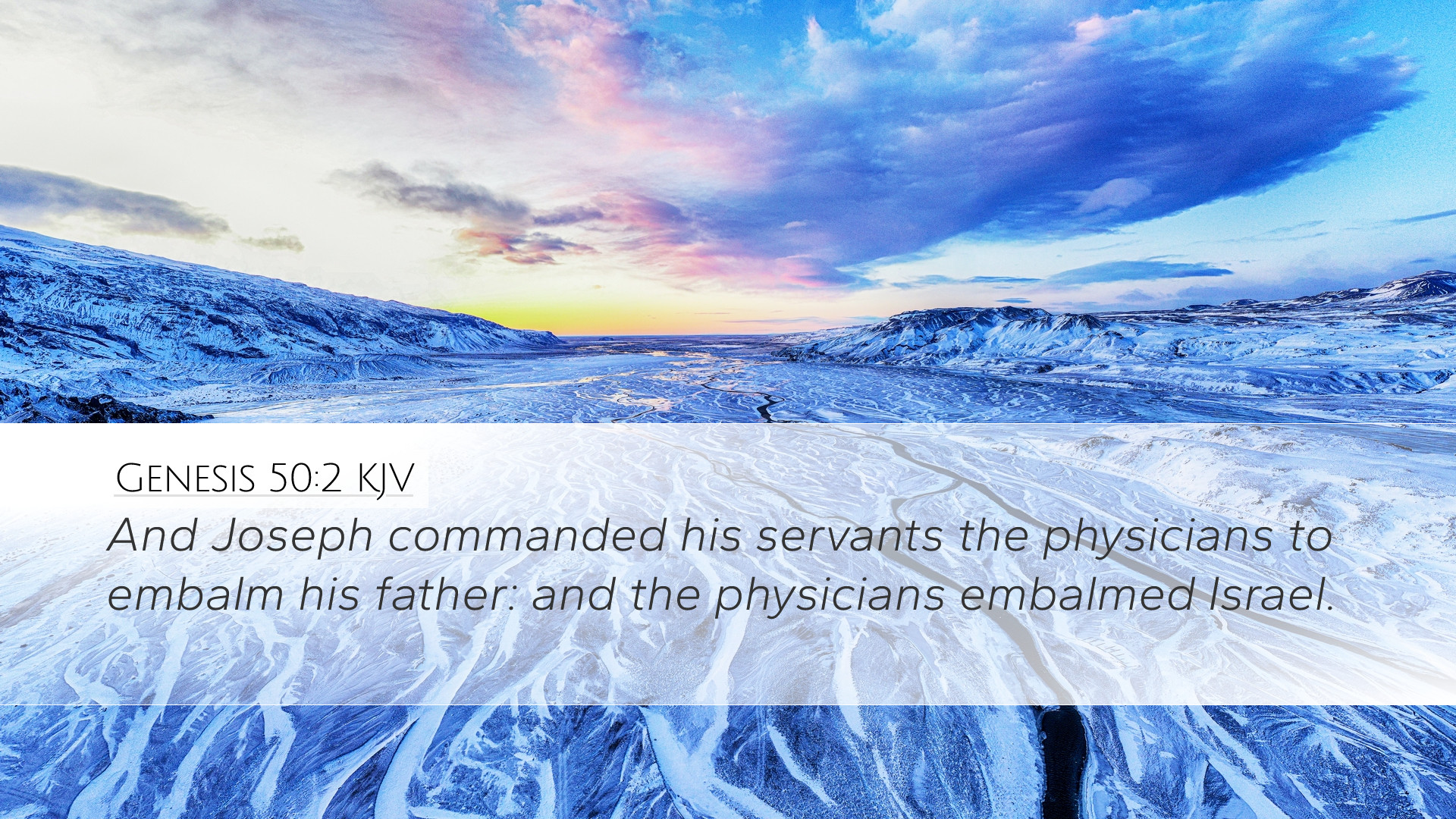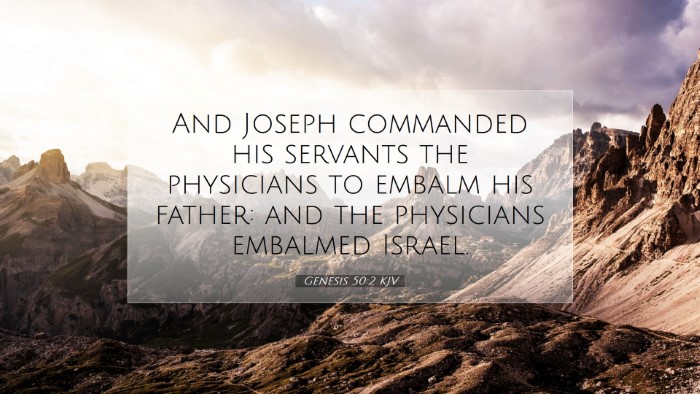Commentary on Genesis 50:2
Bible Verse: "And Joseph commanded his servants the physicians to embalm his father: and the physicians embalmed Israel." (Genesis 50:2)
Introduction
This verse occurs at a significant moment in the narrative of Joseph and his family. Following the death of Jacob (Israel), Joseph takes steps to honor his father's memory through the ancient practice of embalming. This commentary will explore the implications of this verse, drawing insights from several public domain commentaries.
Joseph’s Action: A Gesture of Honor
Joseph’s command to embalm his father highlights his deep respect and love for Jacob. Matthew Henry notes that this act signifies the value Joseph placed on his father's life and legacy. In a culture where burial rituals were highly significant, Joseph, despite his high status in Egypt, did not forget his familial duties.
Significance of Embalming
Embalming was a common practice in ancient Egypt, which served both practical and spiritual purposes. Albert Barnes emphasizes that this practice aided in preserving the body for a prolonged period, reflecting the prevailing Egyptian beliefs about the afterlife. This intertwining of culture and faith highlights Joseph's alignment with Egyptian customs while still honoring his heritage.
The Role of Physicians
The verse mentions Joseph commanding "his servants the physicians." This indicates a trust in skilled professionals to perform this sacred task. Adam Clarke points out that the role of the physicians here is not mere physical preservation but rather a fulfillment of a cultural and familial obligation.
Understanding the Role of Physicians in Ancient Egypt
- Expertise: Physicians in ancient Egypt were highly trained individuals who had significant knowledge of anatomy and the embalming process.
- Responsibility: Their role extended beyond mere medical treatment; they were also custodians of the dead, ensuring proper rites were conducted.
- Cultural Reverence: Their involvement in the embalming signifies the importance of cultural practices in dealing with death and mourning.
Theological Insights
From a theological perspective, Jacob's embalming can reveal much about the human condition and God's promises. Matthew Henry emphasizes that death, though a natural part of life, is inseparable from our spiritual journey. Joseph's actions can be seen as a way of affirming the hope of resurrection and God’s eternal covenant with His people.
Connection to God’s Covenant
Joseph's choice to embalm Jacob ties into the larger narrative of God's covenant with Abraham, Isaac, and Jacob. This moment serves as a reminder of God’s faithfulness through generations. Albert Barnes notes that by ensuring Jacob's proper rites, Joseph acknowledges the covenant promises made to their ancestors and affirms their continuity through the lineage.
Ancient Practices and Modern Reflections
While embalming may not be a common practice among many cultures today, the underlying sentiment behind Joseph's actions resonates with contemporary understandings of love, memory, and respect for the deceased. Adam Clarke reflects on how traditions surrounding death can foster community and cultural identity.
Modern Comparisons
- Funeral Practices: Many cultures have rituals that honor the deceased, reflecting a desire to remember and celebrate life.
- Acts of Service: The way we care for the dying and honor the dead speaks volumes about our values and beliefs.
- Legacy and Memory: Just as Joseph honored Jacob, individuals today strive to leave legacies that reflect their values and love.
Conclusion
Genesis 50:2 reveals profound insights into human relationships, cultural norms, and theological implications surrounding death. Joseph's actions to embalm his father symbolize much more than preservation; they embody respect, love, and a commitment to familial responsibilities. Through this verse, we are reminded of the sacredness of life and death, as well as the continuity of God's promises across generations. The reflections provided by the commentaries of Matthew Henry, Albert Barnes, and Adam Clarke enrich our understanding, offering timeless wisdom for pastors, students, theologians, and Bible scholars.


